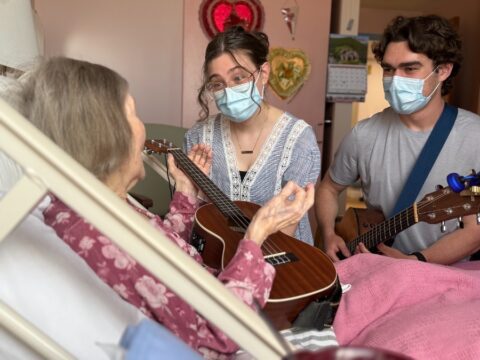It’s a cool Sunday morning in early October and the prairie sunshine has just started to work its way through the tipi canvas when Herman Many Guns, an Elder of the Piikani Nation (Blackfoot) begins to speak. A diverse group of children and adults are gathered around him in a semi-circle to listen to Many Guns tell the story of the Blackfoot’s relationship to the land and food. Finally, he burns a braid of sweetgrass and leads the group in a blessing and tobacco offering to Creator for another plentiful harvest.
Many Guns’ blessing is the introduction for the group’s fall harvest celebration of their community farm called the Land of Dreams. It is a 30-acre farming plot located in the middle of Calgary’s southeast industrial zone, on Treaty Seven land, surrounded by warehouses and trucking depots. The farm is an ambitious project run by the Calgary Catholic Immigration Society (CCIS) to give newcomers a chance to learn how to grow healthy, affordable food in southern Alberta’s climate from Indigenous elders and skilled organic farmers.
This is the fifth fall harvest at the Land of Dreams, which opened in 2019 after the land was leased by the province to CCIS. Two full time staff work on the farm, organizing visits from elders and educational activities, ordering seeds, and coordinating participants and volunteers for big projects like installing irrigation ponds and compost bins.
But the Land of Dreams is about more than just teaching sustainable gardening techniques – although that focus has attracted plenty of passionate local gardening and farming experts who volunteer their knowledge and skills. For many of the newcomers at the Land of Dreams, the chance to tend to a plot of land and grow their own food is a welcome respite from the pressures of life in Canada: from affordability, to coping with stress and trauma, to simply missing their home countries.
“Some of the people here have similar, almost identical stories,” Many Guns says. Several newcomers have left behind countries devasted by colonialism, land displacement and genocide when they move to Canada. But when they arrive at Land of Dreams, they can share their love for harvesting the land. Many Guns says one’s spiritual relationship to the land can heal trauma and build emotional resilience.
After the blessing, the Land of Dreams community of newcomers, volunteers, and CCIS staff gather for a potluck of foods traditional to newcomer’s home cuisines – some with ingredients grown at the Land of Dreams. People sip on cups of sweet, milky Afghan chai while they line up for the potluck. Members of Calgary Vietnamese Golden Age Club dance to the music and take turns posing in their colourful party clothes. On the table is an impressive spread including sauteed black nightshade, an African vegetable that participants were proud to grow in Calgary, a plate of dumplings made by participants from the Yezidi community and seasoned rice that a little girl describes as “just a little spicy.”
The farm is reflective of Calgary’s growing diversity and the federal government’s push to bring more newcomers to Canada to increase the country’s population. Gordana Radan, the CEO of CCIS notes that Calgary is the third most popular destination for newcomers to Canada. They’re drawn by the comparatively low cost of living and the city’s reputation for good services. Despite the federal government’s expansive ambitions, funding for immigration services is uncertain. Radan declined to comment when asked about cuts in funding for services like CCIS, which caused major layoffs documented in local media over the summer.
Despite these pressures, the mood at the harvest is one of gratitude. Kamo*, a woman from the Yezidi community in northern Iraq, is doling out pieces of chicken from one of her favourite recipes. “The farm is where I come to breathe,” she says. She grew up on a farm in Sinjar, a small town in northern Iraq. It was encircled by the Islamic State in 2014, who subjected the Yezidi people to genocide. She shows me pictures of her uncle’s farm and the lush produce they were able to grow in Iraq. In Calgary, she and her five surviving children live in an apartment with a small balcony where she grows flowers, but she started coming to the Land of Dreams since it opened in 2019 because she missed working with the land, growing vegetables to nourish her family. She shares the plot with a group of 12 other Yezidi women where they grow garlic, beans, tomatoes and a swiss chard they use to make dolma, traditional stuffed grape leaves.
More on Broadview:
- How thanking God before meals repaired my complicated relationship with food
- How one community leader is fighting for food security in Newfoundland and Labrador
- It’s time to take a closer look at what we’re eating for Thanksgiving
The rounded plots of land are laid out in a circular medicine wheel design to reflect community and healing. Next to the Yezidi group’s plot are the Senegalese and Cameroonian plots, where Racine*, a Senegalese man, is helping Ghislaine*, a Cameroonian woman perfect their potato-digging technique. Her son, daughter, niece and nephew race around their feet, competing against one another to uncover the most potatoes. She says the farm has been an opportunity for her to meet other gardening enthusiasts and build community with other newcomers.
Racine started going to Land of Dreams almost every day after feeling cooped up in the pandemic. He often brings his kids. When his six-year-old daughter finds out he’s gone to the farm without her, she gives him a hard time, he says with a smile. Coming to the farm is emotional for him. His father was an agronomist in Senegal who taught him the importance of growing nutritious food. “I come here to feel the spirit of my father and I bring my kids so they can keep that spirit alive,” he says.
As the fall harvest takes place after Truth and Reconciliation Day, Many Guns says he feels Indigenous teaching at the farm is more important than ever. He got involved because he wanted to teach the “new generation of newcomers who we are,” away from negative stereotypes of Indigenous peoples they might have heard. He also wants to build bridges with people to respectfully share the land.
“It’s about taking some of their concepts and some of our concepts to make a new approach so that the younger generation coming from all over the world will feel comfortable sharing this land,” says Many Guns.
*Surnames have been excluded for privacy, as some migrants are refugees.
***
Claire Porter Robbins is a Calgary-based writer and former aid worker with experience in the Middle East and the Balkans. She has previously edited for the Globe and Mail. She can be found on Twitter at @claireporterr.















